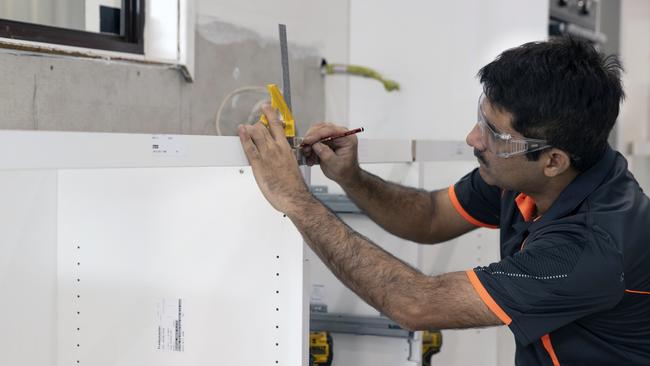Australian tradies fear jobs pipeline slowdown as many overhaul businesses to stay afloat
Australian tradies are overhauling their services in a bid to stay afloat, as many feel the pinch from a slowdown in the economy, which online marketplace hipages says could soon turn.

Australian tradies are overhauling business models in a bid to stay afloat as many increasingly feel the pinch from a slowdown in demand ascost-of-living pressures and the impact of fewer homes being built weigh on the sector.
Online tradie marketplace hipages warned that tradies are increasingly having to be more versatile and make changes to their businesses in a bid to stay afloat despite it saying that there were many signs of a pick-up in the number of Australians looking to undertake home improvements.
Data from hipages, which is part-owned by News Corp, publisher of The Australian, shows that 78 per cent of tradespeople are concerned about their project pipeline, a 5 per cent increase from 2023.
These concerns have been amplified by higher building costs, supply shortages and post-pandemic labour issues that wiped out thousands of tradie businesses over the past year. Data from Australian Securities & Investments Commission shows construction insolvency appointments rose 34.5 per cent to 2977 over the past financial year, and a further 833 have gone bust since July.
While the rate of failures has slowed as pressures ease, hipages chief revenue officer Robert Tolliday said that concern among tradies had risen in the past year.

“There has been a slowdown in new home constructions and also development. The home improvement sector, which we are heavily involved in, has been rocky too,” he said.
“Tradies aren’t immune to petrol prices and grocery prices and interest rates and other pressures and that are feeding into their job flow because consumers have been more cost conscious, and less likely to be spending as much on their houses in terms of improvements.”
Mr Tolliday said those in the home improvement industry were having to adapt their business model to stay afloat and to remain competitive (by) branching into new areas.
hipages reported that 82 per cent of tradies were making changes to their businesses with 41 per cent having expanded service areas, while 37 per cent had upped business hours and about a third were looking to hire new apprentices and offer green services respectively.
“I’ve met a plumber who had gone and become a qualified electrician to install air conditioners as well. Tradies are trying to be entrepreneurial and do things differently, as simple as travelling further for a job or extending their houses to do 24-hour services,” he said.
These adjustments come as rising costs for new builds or purchases are motivating homeowners to stay put. Hipages said 67 per cent of homeowners are planning a renovation or repair within the next 12 months, with half expecting to spend more than $7000 on these projects.
“Tradies are adapting; they’re doing good things differently to try and keep their businesses afloat and while they’re concerned about that, we are starting to see some green shoots in terms of jobs coming through,” he said.

There should be an increased amount of home improvement jobs that are coming into the marketplace, which is helpful. We are seeing a little bit more confidence come through from homeowners who are now open to spending more money around the house
hipages had seen increased demand for tradies in the past month and expected that it would not be far before Australia hit a turning point where demand picked up.
Analysis by MA Financial of ABS data shows that building materials price rises had moderated, with timber down by 0.5 per cent in the 12 months to the March quarter.
Ceramic and cement products increased 1.8 per cent and plumbing products were down 0.4 per cent. Steel was up 0.8 per cent in the period.
Higher construction costs and labour shortages have seen approvals for new dwellings fall across Australia since the pandemic. Data from the Australian Bureau of Statistics shows house and apartment approvals in August fell 6.1 per cent to 13,991 compared with July.
This was driven by a 16.5 per cent drop in approvals for middle- to high-density homes, such as apartments and units, and comes after a record wave of immigration in 2023.



